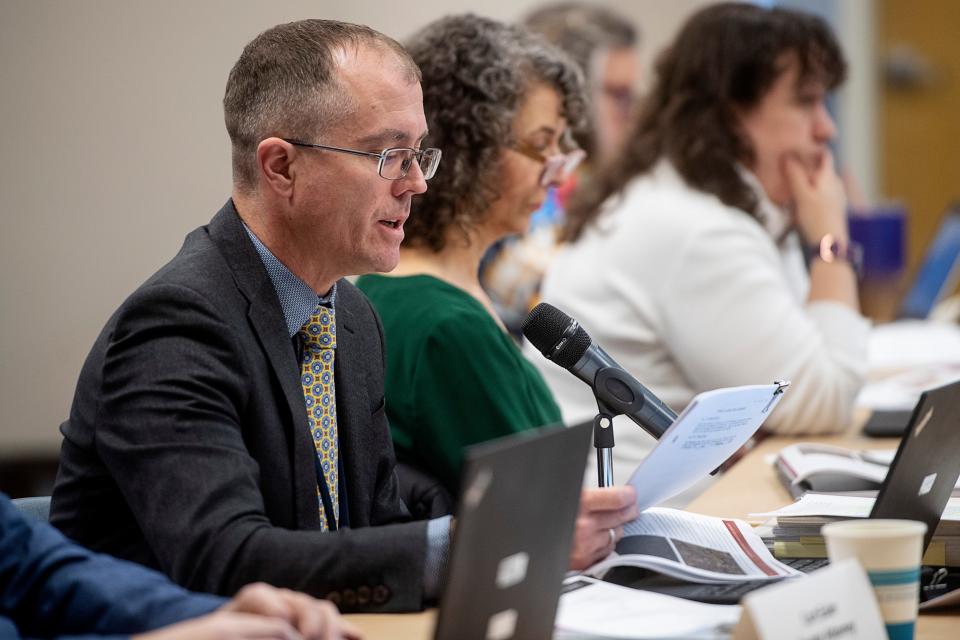While banned in Asheville, Airbnbs are unrestricted in the county. That might change.
ASHEVILLE - A 2018 city ban on new short-term rentals left untouched the booming vacation rental industry outside city limits ― but that may change as county government now eyes restrictions.
The city ban on new short-term rentals ― often called Airbnbs after their most popular online rental platform ― came about as Asheville struggled with its housing crisis. Buncombe County leaders are now facing a similar crisis and say banning STRs from residential zoning districts could help.
"Our demand so outstrips our meager supply of housing," county Planning Director Nathan Pennington told the Citizen Times Jan. 5.
New short-term rentals are all but banned in city limits, only being allowed in resort districts. Homestays, in which an owner rents out part of their primary residence, are not banned.
But proposals that include allowing the rentals only in commercial districts ― with an option to grandfather in existing STRs ― are facing pushback. A Dec. 18 planning board meeting was packed with public comment stretching on to the point that the board chose to hold another meeting at a larger auditorium. That 5:30 p.m. Jan. 22 event at AB Tech's Ferguson Auditorium, is also expected to be well attended.
"We probably want to reserve the entire meeting for public comment," Pennington said.
Among those opposing new restrictions was Asheville real estate broker and STR owner Jay Hamilton. Instead, the county should change zoning to allow singlewides and other manufactured housing in more zoning districts, Hamilton said.
"There's nothing in here that addresses the most affordable housing segment, which is manufactured housing," he said.
The Planning Board could vote by March on whether to recommend the restrictions with a final decision coming from later from the county's elected Board of Commissioners.
Along with restrictions, county leaders are exploring a program to pay STR owners to convert them to long-term rentals.
The Citizen Times reached out Jan. 5 to commissioners Chair Brownie Newman. Newman, who chose not to run for reelection, is serving his last year as head of the all-Democratic board. Elections for chair and three of the three of the six other commissioners are this year with primaries March 5 and the general election Nov. 5.
Despite $500 daily fines, Asheville continues to fight to enforce the ban. Other Buncombe municipalities, meanwhile, have added restrictions, such as Woodfin that banned STRS in residentially zoned areas. Black Mountain is exploring rules including requiring a property manager to live within 60 miles.
Buncombe's housing stats
A 2021 Dogwood Health Trust study said that Buncombe's long-term rental housing gap was 7,699 units when considering population and demand, while the shortage of homes to buy was 2,048 units.
According to a Dec. 1 memo prepared by the planning department for the volunteer advisory Planning Board, 70% of residents counted in the housing gap make half or less than the area median income. AMI is now $59,500 for an individual and $85,000 for a family of four.
"Therefore, the loss of housing to short-term rentals uniquely affects Buncombe’s low-income population," the planning department memo said.
Restricting STRS "will affect low and middle-income renters, home buyers, and local workers by seeking to make more housing stock available for long-term rentals and owner-occupied housing," the planning staff memo said.

Short-term rentals now in the county
As of 2022, there were at least 5,268 STRs in the unincorporated parts of the county, according to county contractor Clarion and Associates that used the AirDNA software system.
That is roughly 4.5% of the county’s housing stock, meaning STRs account for around 68% of the rental housing gap of 7,699 units.
Proposed restrictions
Among proposed restrictions are bans of STRs in residentially-zoned areas and in apartment complexes and other multi-family developments, deemed to be the places that are often most affordable.
Other proposals say existing STRs in residential areas could get zoning permits to continue operation, though if sold or otherwise transferred by deed they would lose that permit.
County planning staff say they could measure if the regulations work by tracking the number of rental units and "ownership units" that are available for people earning less than 80% of area median income, a percentage that now comes to $47,600 for one person and $68,000 for a family of four.
Pushback
Among those opposing restrictions is Hamilton, the Asheville real estate broker and STR owner. He questioned whether STRs truly reduce affordable housing, saying the rules were an unnecessary infringement.
"I think you do everything you can to offer affordable housing solutions. And I think you avoid everything you can to take property rights away from individuals," he said.
More: Asheville Airbnb fraudster sentenced to nearly 8 years for lying to banks, gun crime
Short-term rentals pose problems for some in Black Mountain but a boon for tourism economy
Joel Burgess has lived in WNC for more than 20 years, covering politics, government and other news. He's written award-winning stories on topics ranging from gerrymandering to police use of force. Got a tip? Contact Burgess at jburgess@citizentimes.com, 828-713-1095 or on Twitter @AVLreporter. Please help support this type of journalism with a subscription to the Citizen Times.
This article originally appeared on Asheville Citizen Times: Airbnbs are banned in Asheville, but not the county; is change coming?

